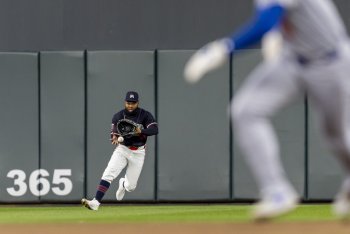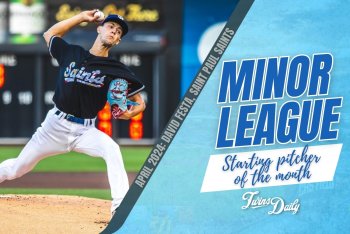
Twins Video
When I first moved to the US, I worked in an upscale deli. I had just been given permission to work, and I needed money badly, a stable income for a few months to get up and running and on my feet. At said upscale deli, ownership (I like to pretend I’m part of a baseball franchise at all times), made us do regular tastings and scorings of the deli’s offerings.
Folks would bring around a tray with samples and we would all score a given sample out of ten, with some brief words of explanation. I knew I wasn’t long for the food industry when others reeled off complex descriptions of how samples affected their palette, while I typically landed into two categories; ‘delicious’ or ‘not my thing’.
What does this have to do with catching? I promise I’m going somewhere with this.
Invariably, scores on samples were really high because the deli only sold delicious food. The one exception to this was coffee. Folks typically scored coffees in the 5-7 range, instead of the typical 8-10 range of other samples? Why? Because most (including myself) didn’t know what they were looking for.
What differentiates a great coffee from a good coffee? Darned if I know. So what does this have to do with baseball? My contention is, tasting fancy coffee and evaluating catchers are the same. We don’t know what we don’t know, and we can’t always account for the subtle nuances that differentiate good from great. So I set out to try to gain a better understanding of the question; what goes into making a good catcher? Where does Jason Castro fall in these criteria?
Hitting
Let’s start with some general numbers on Castro. The reason I wanted to acknowledge hitting is it seems to me that there is generally a poor understanding of what an average offensive catcher looks like in MLB. Catchers like Gary Sanchez, Buster Posey and J.T. Realmuto tend to skew overall perception of what typical catcher offensive production looks like.
Firstly, it’s important to acknowledge how useful it is to have a catcher who plays as much as Castro. In 2017, only 14 catchers made at least 400 PA. Of these 14, Castro finished 10th in fWAR (1.6). Again, of these 14, Castro finished 6th in OBP (behind only Posey, Contreras, Barnhart, Lucroy and Sanchez) and first in BB% (11.1%). While Castro isn’t a plus hitter, he gets on base enough to be a solid offensive contributor in a small group of elite catchers who play as much as he does throughout the course of the season.
Framing
This might seem like a weird place to go next. The reason I’m going here is that when Castro signed with the Twins, he came with a reputation as an excellent pitch framer. When Castro was brought in at the beginning of an otherwise quiet first off-season for Derrick Falvey and Thad Levine, his framing prowess was well established.
In Castro’s final season in Houston, he got 96 more strikes called than expected, good for fifth in MLB. This, combined with the Twins transitioning from Kurt Suzuki, who got 38 less strikes than expected, had a significant positive swing for a Twins pitching staff expected to be mediocre at best in advance of the 2017 season. Several factors resulted in a slightly improved pitching performance in 2017, none more so than Byron Buxton. Castro certainly had an impact too, but what about the other aspects of catching we might be less familiar with?
Regular Fielding
‘Regular fielding’ is an odd term. It simply doesn’t apply to catchers. While defensive metrics like UZR (ultimate zone rating) and DRS (defensive runs saved) give insight into most defensive positions, it’s too general to accurately appropriate to the catcher position. DRS, however, is a useful starting point for analyzing Castro’s fielding. DRS measures the runs saved or cost by a given player compared to a league average player at that position. In 2017 Castro finished ninth among catchers who caught at least 600 innings (34 catchers altogether), with a DRS of 10. Jonathan Lucroy was last at -15.
Preventing Base Stealing
Another important aspect is how catchers handle base runners. rSB is essentially DRS combined with stolen base runs above average. Castro is right around replacement level (20th in MLB among catchers who caught 600 innings) with a 0 rSB. Tucker Barnhart is first at 7.
New Statcast data sheds light on Castro’s performance against base runners. Pop time measures the amount of time from the pitch hitting the catcher’s mitt to the moment the ball reaches the fielder’s receiving point at the center of the base. In 2017, Castro ranked 46th in MLB in pop time at 2.07 (MLB average 2.00). Castro ranked dead middle in MLB in his arm strength and second to last in exchange time. Essentially, he has an averagely strong arm, a slightly below average pop time but a far below average exchange of the ball from mitt to throwing hand.
This resulted in Castro throwing out 26% of base runners, still good for a solid ninth in MLB, in a category where there is a large disparity between solid and great (Wellington Castillo, who ranked first, threw out almost 50% of base runners).
Blocking
Blocking is another element of catcher defensive performance that is difficult to measure. FanGraphs uses RPP (runs on passed pitches) which uses PITCHf/x data to attempt to measure how many runs a catcher saved based on the difficulty of corralling the pitch. PITCHf/x data may not be sufficient to inform this stat as it does not accurately measure whether a pitch should have been controlled by a catcher or not. Statcast may end up providing more accurate data to inform this measurement. FanGraphs’ last metric for Castro was 0.1 with the Astros in 2014, but a lack of data makes comparing him across MLB difficult.
Game Management
Finally, game management is the most difficult skill to evaluate in catcher performance. Catchers have a massive impact on how a pitcher navigates a lineup, where and what pitches they throw etc. Sports Info Solutions attempts to quantify game calling in its Catcher Pitch Calling Runs Above Average metric, or RerC, which is available at Baseball-Reference. Last season, Castro was seven runs above average per that stat. The only catcher to best that mark was Barnhart, who was 10 runs above average.
When it’s all said and done, it’s extremely hard to comprehend how impactful Castro is for the Twins. At catcher, unlike any other position, there exists an intersection between offensive and defensive metrics which impact their contributions to their given team. Castro is a little below average offensively and above average defensively.
If we were tasting a coffee named ‘Castro blend’ we might give it a 7 out of 10. That’s a score the Twins would gladly take over the next two years, as there are very few eights, nines and tens.
Think you could write a story like this? Twins Daily wants you to develop your voice and find an audience. We recruit our paid front page writers from our users blogs section. Start a blog today!
MORE FROM TWINS DAILY
— Latest Twins coverage from our writers
— Recent Twins discussion in our forums
— Follow Twins Daily via Twitter, Facebook or email
— Become a Twins Daily Caretaker









Recommended Comments
Create an account or sign in to comment
You need to be a member in order to leave a comment
Create an account
Sign up for a new account in our community. It's easy!
Register a new accountSign in
Already have an account? Sign in here.
Sign In Now